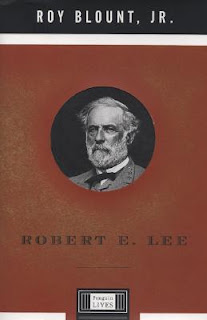© 2003 Roy Blount Jr
272 pages
They say that God in heav'n
is everybody's god
I'll admit that God in heav'n
Is everybody's god
But I tell ya John, with pride,
God leans a little on the side
of the LEES! The LEES OF OLD VIRGINIA!
("The Lees of Old Virginia", 1776)
Recently a patron returned this biography of Robert E. Lee to the library, complaining that as much as he enjoyed it, Lee remained...distant, unknowable, aloft. "Like Washington?" I suggested, and his eyes lit up in recognition, for both men share the same unimpeachable aura in the South. It's an aura of old words -- honor, humility, grace, dignity -- that has long departed politics, and was rapidly dissipating even then. I decided to give the biography a try myself, partially out of deference to its subject (of whom I've read nothing except for military histories) and partially because the author's name rung a bell. I found this Penguin books biography to be short, surprisingly fair-minded, and..a little weird.
Lee's life in brief: born to a dashing Revolutionary War hero who died in disgrace, Lee joined the military to support himself and continued serving even after he married into another elite family, this one with money and a close connection to George Washington. He served with distinction in the Mexican War as a scout and aide to General Scott, and traveled throughout the southern and western parts of the country shoring up fortifications and fighting Indians. Lee's sympathies were not with the Confederacy, and he shared the attitude that the Virginia legislature displayed when it voted against secession. However, after Lincoln inaugurated civil war by calling for troops to invade the South, Virginia turned about completely -- seceding and organizing its own defense. After turning down an opportunity to lead the northern army against the South, Lee resigned his commission and went to Virginia's aid. Within a year's time he would be given command of the Army of Northern Virginia, and there wrestle down a series of generals until Grant and material exhaustion defeated the cause. In the postwar years, he served a the president of a college and then passed away before reconstruction ended.
Roy Blount Jr's name is not one I have heard associated with Civil War history, military history, southern history, law, politics, or anything that would suggest connection to writing about a Civil War personality. He is a humorist, a fellow I've only heard on NPR. His literary nature comes out strongly here, with numerous digressions in which Blount chats about grammar or Lee's connection with men of letters . Stranger are the Freudian digressions in which Blount speculates Lee charged the high ground at Gettysburg to psychologically overcome his father's beating at the hands of an anti-British mob in 1812. Media personalities are allowed a bit of eccentricity in their writing, I suppose. What I did appreciate is that Blount admires Lee's character without lionizing him, and admits his faults without condemning him. Specifically, Blount writes that Lee had been born into a morally compromised position: as much as he might detest slavery, he never forthrightly condemned it. Blount attributes this to authentic paternalism of Virginia's old blood, in which they earnestly believed that people held in American slavery were better off than living in a state of nature in Africa. A letter written by Lee in 1856 expressed his hope that Providence was guiding America to be able to free itself of the burden of slavery, though he objected to the abolitionist's desire to do it immediately by force. This was not an effort by Lee to protect his 'property', for he began working to free his father-in-law's slaves as soon as he inherited them. It was rather Lee's attempt to keep himself conciliated with his home, for who wants to regard their own culture and country as vicious? Hope allowed him to serve Virginia's defense. While the ruling planter class initiated secession to protect slavery from Republican abolitionists, the war itself was fought by men like Lee and the common soldiery for more universal motives: duty to home and brothers-in-arms; sheer cussedness, and because they had to. (Drafts were forcefully used by both the ruling classes in both states, union and confederate.)
Blount's cover of Lee is thus a very general biography, one that should suffice if a reader knows nothing about Lee at all. Most of this I had absorbed through various Civil War histories, but enjoyed the narrative even with its Freudian quirks.

i've never read much about him, but the little i know agrees with the description of him as distant, reserved, and quiet... i suppose a more detailed bio might attempt to analyze his reaction to Chancellorsville, Antietam, Bull Run, and all the other maelstroms of death and destruction occurring at the time... but i'd just as soon not read about those; human suffering is a given, and, frankly, i'd rather think about something more delightful... like POGO!! haha...
ReplyDeleteI wonder how much of his reserved character was personal and how much was class-based..
ReplyDeleteDitto on not wanting to read about too much death and destruction -- that's the reason I never finished Jeff Shara's Civil War-west trilogy. The endgame was too brutal.
Lee is only defeated in the same sense that Leonidas was -- in military and physical arms. In memory he lives on, and I daresay is more popular than any other Civil War general, union or confederate. Military historians or ACW enthusiasts may admire Grant's strategy, but they don't love the MAN.
ReplyDelete